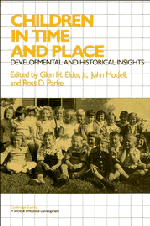Book contents
- Frontmatter
- Contents
- Preface
- Acknowledgments
- List of contributors
- Part I A proposal
- Part II Historical and life transitions
- Part III Life transitions across historical time
- Part IV The cross-disciplinary collaboration
- 8 The workshop enterprise
- 9 The elusive historical child: Ways of knowing the child of history and psychology
- 10 A paradigm in question: Commentary
- 11 Epilogue: An emerging framework for dialogue between history and developmental psychology
- Bibliography
- Author index
- Subject index
8 - The workshop enterprise
Published online by Cambridge University Press: 03 May 2011
- Frontmatter
- Contents
- Preface
- Acknowledgments
- List of contributors
- Part I A proposal
- Part II Historical and life transitions
- Part III Life transitions across historical time
- Part IV The cross-disciplinary collaboration
- 8 The workshop enterprise
- 9 The elusive historical child: Ways of knowing the child of history and psychology
- 10 A paradigm in question: Commentary
- 11 Epilogue: An emerging framework for dialogue between history and developmental psychology
- Bibliography
- Author index
- Subject index
Summary
The necessary groundwork laid the first day was the realization that the psychologists had no grand theories to offer and the historians had few solid, interesting trends to offer.
Steven Schlossman (personal communication, 1984)The studies in this volume up to this point represent the end point of a collaborative process that began in the 1980s. In this chapter we will take you back on our journey through this process, from the initial planning session to a series of workshops and a good many research meetings. The authors of the preceding chapters are not a perfect match for the authors of papers at the workshops. Consistent with the nature of workshops, some new working arrangements developed out of the discussion sessions.
The nature of cross-disciplinary study is best experienced by taking on the roles of the historians and the developmentalists in their struggle to work out a common ground. We hope that the lessons of this collaborative process will inform and strengthen cross-disciplinary ventures in the years to come.
The proposal
Responding to the rapidly expanding interest in aging across the life span, a group of social scientists led by Matilda Riley of the National Institute on Aging formed a committee (circa 1977) at the Social Science Research Council to pursue a deeper, multidisciplinary understanding of human development over the life course, with particular emphasis on the middle and later years (Elder, 1985; Sorensen, Weinert, & Sherrod, 1986).
- Type
- Chapter
- Information
- Children in Time and PlaceDevelopmental and Historical Insights, pp. 173 - 191Publisher: Cambridge University PressPrint publication year: 1993
- 3
- Cited by

